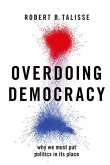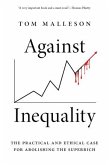28,99 €
inkl. MwSt.
Versandfertig in über 4 Wochen

14 °P sammeln
- Broschiertes Buch
- Merkliste
- Auf die Merkliste
- Bewerten Bewerten
- Teilen
- Produkt teilen
- Produkterinnerung
- Produkterinnerung
Tackling perhaps the most contentious and socially urgent political movement of the last century, Scott R. Sehon lays bare the arguments for and against socialism, investigating their logical scaffolding and revealing exactly what is assumed in the charged and often vital discussions on labor conditions and human well-being. Socialism presents an analytical introduction to the movement and investigates the reasons why a democratic socialist direction is the preferrable path forward.
Andere Kunden interessierten sich auch für
![The ABCs of Socialism The ABCs of Socialism]() The ABCs of Socialism16,99 €
The ABCs of Socialism16,99 €![Embracing Alienation Embracing Alienation]() Todd McgowanEmbracing Alienation20,99 €
Todd McgowanEmbracing Alienation20,99 €![The Labour Party and Whitehall The Labour Party and Whitehall]() Kevin TheakstonThe Labour Party and Whitehall24,99 €
Kevin TheakstonThe Labour Party and Whitehall24,99 €![Overdoing Democracy Overdoing Democracy]() Robert B. Talisse (W. Alton Jones Professor of Philosophy and ProfeOverdoing Democracy20,99 €
Robert B. Talisse (W. Alton Jones Professor of Philosophy and ProfeOverdoing Democracy20,99 €![Against Inequality Against Inequality]() Tom Malleson (Associate Professor in the Department of Social JustiAgainst Inequality33,99 €
Tom Malleson (Associate Professor in the Department of Social JustiAgainst Inequality33,99 €![The 99 Percent Economy The 99 Percent Economy]() Paul Adler (Professor of Management and Organization, of Sociology,The 99 Percent Economy116,99 €
Paul Adler (Professor of Management and Organization, of Sociology,The 99 Percent Economy116,99 €![The Two Faces of Democracy The Two Faces of Democracy]() Mary F. Scudder (Associat Associate Professor of Political ScienceThe Two Faces of Democracy31,99 €
Mary F. Scudder (Associat Associate Professor of Political ScienceThe Two Faces of Democracy31,99 €-
-
-
Tackling perhaps the most contentious and socially urgent political movement of the last century, Scott R. Sehon lays bare the arguments for and against socialism, investigating their logical scaffolding and revealing exactly what is assumed in the charged and often vital discussions on labor conditions and human well-being. Socialism presents an analytical introduction to the movement and investigates the reasons why a democratic socialist direction is the preferrable path forward.
Hinweis: Dieser Artikel kann nur an eine deutsche Lieferadresse ausgeliefert werden.
Hinweis: Dieser Artikel kann nur an eine deutsche Lieferadresse ausgeliefert werden.
Produktdetails
- Produktdetails
- Verlag: Oxford University Press Inc
- Seitenzahl: 272
- Erscheinungstermin: 19. Juni 2024
- Englisch
- Abmessung: 233mm x 156mm x 21mm
- Gewicht: 360g
- ISBN-13: 9780197753347
- ISBN-10: 0197753345
- Artikelnr.: 69115242
- Herstellerkennzeichnung
- Libri GmbH
- Europaallee 1
- 36244 Bad Hersfeld
- gpsr@libri.de
- Verlag: Oxford University Press Inc
- Seitenzahl: 272
- Erscheinungstermin: 19. Juni 2024
- Englisch
- Abmessung: 233mm x 156mm x 21mm
- Gewicht: 360g
- ISBN-13: 9780197753347
- ISBN-10: 0197753345
- Artikelnr.: 69115242
- Herstellerkennzeichnung
- Libri GmbH
- Europaallee 1
- 36244 Bad Hersfeld
- gpsr@libri.de
Scott Sehon is the Joseph E. Merrill Professor of Philosophy at Bowdoin College, where he has been teaching for over 30 years. He is the author of Free Will and Action Explanation: a Non-Causal, Compatibilist Account (Oxford University Press, 2016) and Teleological Realism: Mind, Agency, and Explanation (MIT Press, 2005), and has appeared in such journals as American Philosophical Quarterly and Philosophical Issues. He has also written for Jacobin, Mises Institute: Power & Market Blog, and Aeon.
* Acknowledgments
* Part I. Introduction
* 1. Logic and Arguments
* Argument Ad Hominem
* What Is an Argument?
* A Sample: Socialism and Starvation
* A Look Ahead
* 2. Defining "Socialism"
* Don't Argue about Words
* It All Comes in Degrees
* The Classical View
* Some Rough Distinctions
* Scandinavia and Democratic Socialism
* 3. Moral Philosophy Background and The Master Arguments
* The Fundamental Question
* A Moral Framework
* Promoting Well-Being
* Rights
* Part II. Rights-Based Arguments
* 4. Does Socialism Violate Rights?
* Socialism and Political Rights
* Socialism and Economic Rights
* Self-ownership and the Nonaggression Principle
* Self-authorship and Economic Rights
* 5. Does Capitalism Violate Rights?
* Extraction of Surplus Value: The Basic Idea
* Initial attempts at an argument
* Filling the gap in the argument: the exploitation principle
* Final version of the argument
* Evaluating premise (2) of Capitalism Exploits: Is the Distribution
Undeserved?
* Evaluating premise (1) of Capitalism Exploits: Is It Unfair?
* Part III. Socialism and Human Well-being
* 6. The Progress Argument
* Empirical Evidence and The Master Arguments
* Humanity's Spectacular Progress
* Capitalism as the Explanation?
* Correlation Versus Causation and the Capitalist Argument
* Testing the Capitalist Hypothesis: Data from 20th Century Communism
* Science and Technology as the Real Explanation
* 7. Redistribution: Inequality and Envy
* The Pettiness of Envy
* Diminishing Marginal Utility Versus Incentives
* The Empirical Evidence: Optimal Rates of Taxation
* Inequality Is Toxic
* 8. Collective Control: The Democracy Argument
* Empirical Correlations: Scandinavia Again
* Community versus Competitiveness
* Why Is Democracy Good? The All Affected Principle
* Democracy and Traditional Governmental Functions
* Democracy and Economic Decisions
* Market Socialism
* Markets and the Capitalist Reply to The Democracy Argument for
Socialism
* Part IV. Capitalism and Human Well-being
* 9. The Case for Markets
* Hayek: The Better Information Argument
* Friedman: The Better Incentives Argument
* 10. Market Failures I: Public Goods
* The Argumentative Situation
* Hayek and the Diffuse Benefit of Some Services
* Applications
* 11. Market Failures II: Monopolies and Monopsonies
* Monopolies
* Where Shopping Is Impractical
* Monopsony and Labor
* "Government is not the solution"?
* 12. Market Failures III: Neighborhood Effects and Climate Change
* Negative Externalities and Neighborhood Effects
* Other Examples
* The No-brainer? Future Generations and climate change
* 13. Conclusion
* A Brief Annotated Selection of Suggested Readings
* Part I. Introduction
* 1. Logic and Arguments
* Argument Ad Hominem
* What Is an Argument?
* A Sample: Socialism and Starvation
* A Look Ahead
* 2. Defining "Socialism"
* Don't Argue about Words
* It All Comes in Degrees
* The Classical View
* Some Rough Distinctions
* Scandinavia and Democratic Socialism
* 3. Moral Philosophy Background and The Master Arguments
* The Fundamental Question
* A Moral Framework
* Promoting Well-Being
* Rights
* Part II. Rights-Based Arguments
* 4. Does Socialism Violate Rights?
* Socialism and Political Rights
* Socialism and Economic Rights
* Self-ownership and the Nonaggression Principle
* Self-authorship and Economic Rights
* 5. Does Capitalism Violate Rights?
* Extraction of Surplus Value: The Basic Idea
* Initial attempts at an argument
* Filling the gap in the argument: the exploitation principle
* Final version of the argument
* Evaluating premise (2) of Capitalism Exploits: Is the Distribution
Undeserved?
* Evaluating premise (1) of Capitalism Exploits: Is It Unfair?
* Part III. Socialism and Human Well-being
* 6. The Progress Argument
* Empirical Evidence and The Master Arguments
* Humanity's Spectacular Progress
* Capitalism as the Explanation?
* Correlation Versus Causation and the Capitalist Argument
* Testing the Capitalist Hypothesis: Data from 20th Century Communism
* Science and Technology as the Real Explanation
* 7. Redistribution: Inequality and Envy
* The Pettiness of Envy
* Diminishing Marginal Utility Versus Incentives
* The Empirical Evidence: Optimal Rates of Taxation
* Inequality Is Toxic
* 8. Collective Control: The Democracy Argument
* Empirical Correlations: Scandinavia Again
* Community versus Competitiveness
* Why Is Democracy Good? The All Affected Principle
* Democracy and Traditional Governmental Functions
* Democracy and Economic Decisions
* Market Socialism
* Markets and the Capitalist Reply to The Democracy Argument for
Socialism
* Part IV. Capitalism and Human Well-being
* 9. The Case for Markets
* Hayek: The Better Information Argument
* Friedman: The Better Incentives Argument
* 10. Market Failures I: Public Goods
* The Argumentative Situation
* Hayek and the Diffuse Benefit of Some Services
* Applications
* 11. Market Failures II: Monopolies and Monopsonies
* Monopolies
* Where Shopping Is Impractical
* Monopsony and Labor
* "Government is not the solution"?
* 12. Market Failures III: Neighborhood Effects and Climate Change
* Negative Externalities and Neighborhood Effects
* Other Examples
* The No-brainer? Future Generations and climate change
* 13. Conclusion
* A Brief Annotated Selection of Suggested Readings
* Acknowledgments
* Part I. Introduction
* 1. Logic and Arguments
* Argument Ad Hominem
* What Is an Argument?
* A Sample: Socialism and Starvation
* A Look Ahead
* 2. Defining "Socialism"
* Don't Argue about Words
* It All Comes in Degrees
* The Classical View
* Some Rough Distinctions
* Scandinavia and Democratic Socialism
* 3. Moral Philosophy Background and The Master Arguments
* The Fundamental Question
* A Moral Framework
* Promoting Well-Being
* Rights
* Part II. Rights-Based Arguments
* 4. Does Socialism Violate Rights?
* Socialism and Political Rights
* Socialism and Economic Rights
* Self-ownership and the Nonaggression Principle
* Self-authorship and Economic Rights
* 5. Does Capitalism Violate Rights?
* Extraction of Surplus Value: The Basic Idea
* Initial attempts at an argument
* Filling the gap in the argument: the exploitation principle
* Final version of the argument
* Evaluating premise (2) of Capitalism Exploits: Is the Distribution
Undeserved?
* Evaluating premise (1) of Capitalism Exploits: Is It Unfair?
* Part III. Socialism and Human Well-being
* 6. The Progress Argument
* Empirical Evidence and The Master Arguments
* Humanity's Spectacular Progress
* Capitalism as the Explanation?
* Correlation Versus Causation and the Capitalist Argument
* Testing the Capitalist Hypothesis: Data from 20th Century Communism
* Science and Technology as the Real Explanation
* 7. Redistribution: Inequality and Envy
* The Pettiness of Envy
* Diminishing Marginal Utility Versus Incentives
* The Empirical Evidence: Optimal Rates of Taxation
* Inequality Is Toxic
* 8. Collective Control: The Democracy Argument
* Empirical Correlations: Scandinavia Again
* Community versus Competitiveness
* Why Is Democracy Good? The All Affected Principle
* Democracy and Traditional Governmental Functions
* Democracy and Economic Decisions
* Market Socialism
* Markets and the Capitalist Reply to The Democracy Argument for
Socialism
* Part IV. Capitalism and Human Well-being
* 9. The Case for Markets
* Hayek: The Better Information Argument
* Friedman: The Better Incentives Argument
* 10. Market Failures I: Public Goods
* The Argumentative Situation
* Hayek and the Diffuse Benefit of Some Services
* Applications
* 11. Market Failures II: Monopolies and Monopsonies
* Monopolies
* Where Shopping Is Impractical
* Monopsony and Labor
* "Government is not the solution"?
* 12. Market Failures III: Neighborhood Effects and Climate Change
* Negative Externalities and Neighborhood Effects
* Other Examples
* The No-brainer? Future Generations and climate change
* 13. Conclusion
* A Brief Annotated Selection of Suggested Readings
* Part I. Introduction
* 1. Logic and Arguments
* Argument Ad Hominem
* What Is an Argument?
* A Sample: Socialism and Starvation
* A Look Ahead
* 2. Defining "Socialism"
* Don't Argue about Words
* It All Comes in Degrees
* The Classical View
* Some Rough Distinctions
* Scandinavia and Democratic Socialism
* 3. Moral Philosophy Background and The Master Arguments
* The Fundamental Question
* A Moral Framework
* Promoting Well-Being
* Rights
* Part II. Rights-Based Arguments
* 4. Does Socialism Violate Rights?
* Socialism and Political Rights
* Socialism and Economic Rights
* Self-ownership and the Nonaggression Principle
* Self-authorship and Economic Rights
* 5. Does Capitalism Violate Rights?
* Extraction of Surplus Value: The Basic Idea
* Initial attempts at an argument
* Filling the gap in the argument: the exploitation principle
* Final version of the argument
* Evaluating premise (2) of Capitalism Exploits: Is the Distribution
Undeserved?
* Evaluating premise (1) of Capitalism Exploits: Is It Unfair?
* Part III. Socialism and Human Well-being
* 6. The Progress Argument
* Empirical Evidence and The Master Arguments
* Humanity's Spectacular Progress
* Capitalism as the Explanation?
* Correlation Versus Causation and the Capitalist Argument
* Testing the Capitalist Hypothesis: Data from 20th Century Communism
* Science and Technology as the Real Explanation
* 7. Redistribution: Inequality and Envy
* The Pettiness of Envy
* Diminishing Marginal Utility Versus Incentives
* The Empirical Evidence: Optimal Rates of Taxation
* Inequality Is Toxic
* 8. Collective Control: The Democracy Argument
* Empirical Correlations: Scandinavia Again
* Community versus Competitiveness
* Why Is Democracy Good? The All Affected Principle
* Democracy and Traditional Governmental Functions
* Democracy and Economic Decisions
* Market Socialism
* Markets and the Capitalist Reply to The Democracy Argument for
Socialism
* Part IV. Capitalism and Human Well-being
* 9. The Case for Markets
* Hayek: The Better Information Argument
* Friedman: The Better Incentives Argument
* 10. Market Failures I: Public Goods
* The Argumentative Situation
* Hayek and the Diffuse Benefit of Some Services
* Applications
* 11. Market Failures II: Monopolies and Monopsonies
* Monopolies
* Where Shopping Is Impractical
* Monopsony and Labor
* "Government is not the solution"?
* 12. Market Failures III: Neighborhood Effects and Climate Change
* Negative Externalities and Neighborhood Effects
* Other Examples
* The No-brainer? Future Generations and climate change
* 13. Conclusion
* A Brief Annotated Selection of Suggested Readings







